
May 20, 2012
 CR Sunday Interview: Faith Erin Hicks
CR Sunday Interview: Faith Erin Hicks

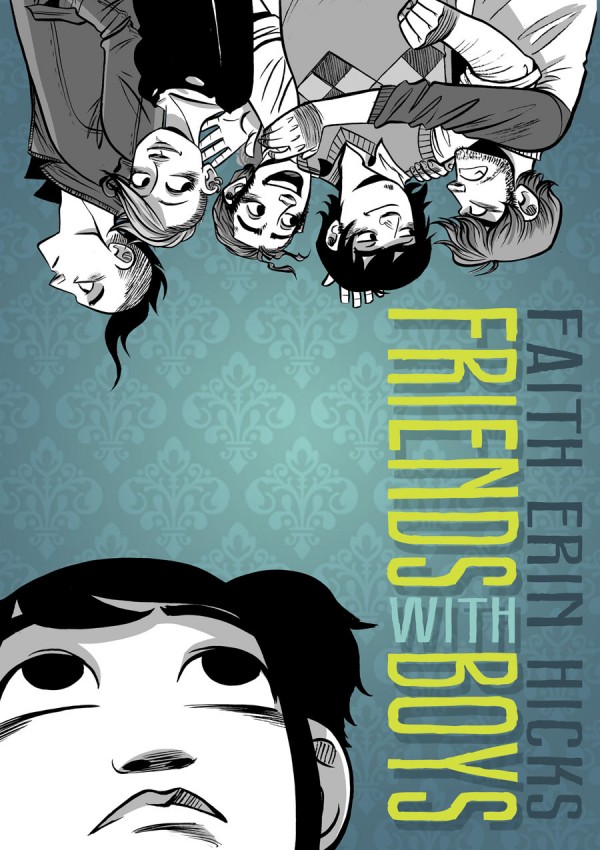
*****
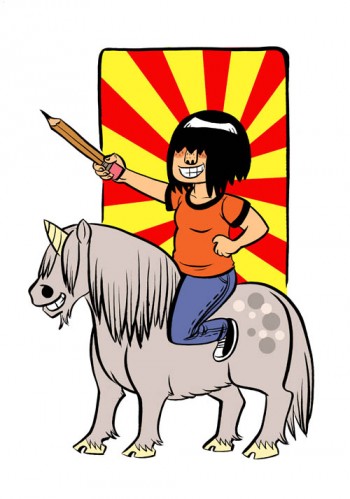 Faith Erin Hicks
Faith Erin Hicks is a living advertisement for comics' ability to invite anyone to the table willing to work once they get there. Hicks just started doing comics, then did some more, then did some that were seen by a few people, then did more that were seen by more people, and now with books like 2010's
Brain Camp and this year's
Friends With Boys to her name, she's fairly unavoidable. I'm not saying that Hicks' best work isn't ahead of her, because I think it is and I think she'd agree with that appraisal. It's just that it's hard to deny that the young cartoonist has put together a style and a way of working that suits the stories she wants to tell, and that's a significant accomplishment in any artist's career. I look forward to her next book, and to continue with ongoing projects like
her occasional Internet one-off or the now-on-hiatus
The Adventures Of Superhero Girl (if it ever stops being on hiatus).
This interview is almost solely concerned with Hicks' latest,
Friends With Boys. That work builds on its admirable hook of a title in an impressively intuitive way, far more reflective of the cartoonist's idiosyncratic point of view than some kind of brand-building exercise. It's a story less about someone who is friends with a lot of boys than about finding friendship of any kind when one's personal narrative completely swaps in a new context for the old one. There's also a ghost in it, which I initially found strange and which we talk about below. I like the way that Hicks enthusiastically processed the following questions; it's a way to engage something like that that reminds me a lot of her comics. The following was tweaked in almost imperceptible ways for flow. -- Tom Spurgeon
*****
TOM SPURGEON: Faith, one thing I find interesting about your relationship vis-à-vis comics is that while you read some comics like Tintin
you opted out on the comics-shop driven experience. I'm surprised that you didn't end up full-time in prose. What is it specifically about comics, do you think, that's appealed to you in a way that you've ended up doing this for a living as opposed to animation or writing full-time or any of the other choices you must have had? What's fulfilling to you about comics that you don't get anywhere else?
FAITH ERIN HICKS: Oh man, comics are the best because you get to do both writing and drawing. I guess I'm greedy and want to do it all. While there's a lot I loved about animation, if you're low on the totem pole like I was, you only get to be part of one tiny piece of a much larger creative work. The collaborative nature of animation is fun, but I like having more control over the final product. As for prose, I like the visual end of making stories too much to work in a medium that's all writing, although I enjoy the idea behind those illustrated books like
the Wimpy Kid diaries or
Steve Emond's recent work. I wish I had something profound to say as to why I like comics, but I just like them. I like the control you have, I like that they're low cost, and if you both write and draw, you don't have to rely on someone else to produce a finished comic. It's all you.
Just on the comic book store thing, I actually would have dived wholehearted into the comic book shop experience if I'd had the chance, but the local shop I had access to was incredibly unfriendly to a teenage girl. I'd walk by the store entrance about five times before getting up my courage to go in to meekly buy
X-Men comics, so it wasn't so much an opting out, rather a "being chased away." [Spurgeon laughs] Comics can be spectacularly terrible at attracting new readers, even ones that really, really want to read comics. Someone should look into that.
SPURGEON: As I understand your story, you got into comics by doing them. How much of your self-education in comics was simply fulfilling your need to express yourself, and how much were you aware of taking in influences and improving your craft along the way? How self-conscious have you been and do you continue to be about your development?
HICKS: I'd say for the first five to eight years or so, especially while I was doing my old webcomic
Demonology 101, it was me expressing myself. I didn't have much awareness of art or comicking as art, I just wanted to draw this story that I had. I knew my art was improving as I worked, and I desperately wanted it to continue to improve, but I was also sort of... I don't know, if I was aware of anything, it was how limited I was an artist. Comics are really really hard to do, and I've always struggled with the art aspect of them. I feel I spent the last five to eight years just learning how to draw, how to draw people, how to draw trees, how to draw people and trees interacting, and now that I'm emerging from that stage with technical skills, now I can actually learn to make comics. So the last couple years, drawing
Friends With Boys especially, I feel like my comic education has truly begun, now I've gotten that whole "learning to actually draw" thing out of the way.
I'm a lot more knowledgeable and aware of different creators and their work nowadays. I have a good library system and a good local comic store to frequent and I can access and be influenced by so many different types of comics. I get obsessed with certain things about an artists's style: the way
Naoki Urasawa draws noses, the way
Nate Powell draws shoes, the way
Becky Cloonan draws teeth... little pieces of another artist's work can have a huge impact on my work. I noticed my comics changed so much after I discovered Naoki Urasawa. Influence-wise, I feel like I've had two huge impacts on my work:
Jeff Smith, who I discovered back in college -- so probably 2001 -- and Urasawa, who I started reading in 2008.
Now, of course, everything I do is about improving my work. It's a little scary, though. Even though I've drawn comics regularly since 1999, I feel like I've barely scratched the surface. It's crazy, how deep learning to draw comics can go. Is it like this for musicians? Can you play the guitar for 10 years and only feel like you've barely begun to learn?
SPURGEON: How different is webcomics culture right now as opposed to ten years ago, in contrast to when you started putting work on-line? Do you get a sense of different people reading, that people read differently? For instance, I imagine that there are greater and more established avenues for discovery as opposed to just putting stuff out there and crossing your fingers; I also have to imagine that the demands of social media are pervasive, right down to what people might prefer to read.
HICKS: When I first started doing webcomics back in the dark ages of the early '00s, word of mouth was how people found your stuff, but it was on a much smaller scale, and much slower. You'd have to get your comic passed around via e-mail, or posted in forums or linked to by other big artists. The whole crazy gag/meme/weird fandom social media comics thing didn't really exist back then, so maybe people were doing more original stuff, but that's just from what I remember and might not be true. I've never been a big fandom person.
I feel like online comics nowadays are perhaps more mainstream, whatever that word means. Like everyone's making comics and everyone's passing comics around and comics are just this one part of the Internet, like cat pictures or whatever, rather than this specialized section, which was how it felt when I first started making them. Comics back then felt... I guess kind of niche. Now they're part of the rainbow of fun that is the Internet. It feels like a good thing to me, but I'm sure there's a downside to it. I guess people could complain that the craft of online comics is slipping, like, "Oh, this stupid gag comic about
He-Man gets a million
tumblr notes, but this impassioned comic about one's state of being only gets 400." But I don't even really see that, because it seems to me that the good stuff is always rising to the top. Sure, stupid He-Man comics will always get popular play, but whatever, that's the Internet.
SPURGEON: Right.
HICKS: I'm pleased to see people are still attempting long-form, online comics, like
the guy doing Bad Machinery or
Gunnerkrigg Court. I think they're attracting a sizable readership with these longer-form comics, so that makes me happy. If everything online was gag comics and comics about He-Man, I'd be pretty depressed, but that's what's nifty about the Internet: people do the comics they want to do, and damn the torpedoes.
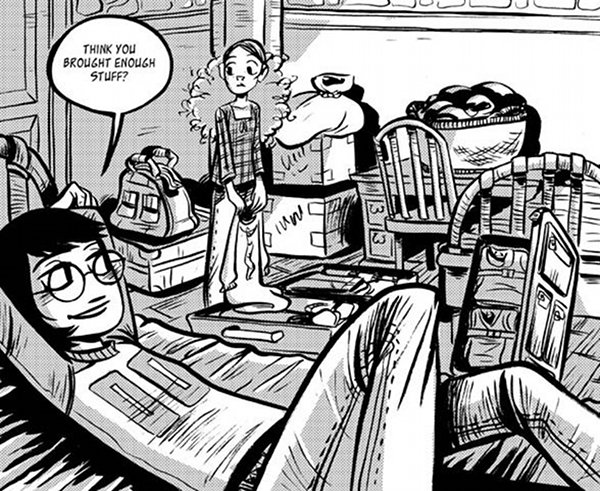 SPURGEON: The career model that you're pursuing is dependent on print, and I wondered about how you feel concerning your initial print experiences with SLG. I think what Dan Vado does is heroic, but I know that the economics of it can be rough. I also have to imagine it's a big deal to get something out there in the world that way. What did you learn by working with SLG? What was it like having that work in print and available to readers that way?
SPURGEON: The career model that you're pursuing is dependent on print, and I wondered about how you feel concerning your initial print experiences with SLG. I think what Dan Vado does is heroic, but I know that the economics of it can be rough. I also have to imagine it's a big deal to get something out there in the world that way. What did you learn by working with SLG? What was it like having that work in print and available to readers that way?
HICKS: Oh god, SLG... my heart kind of bleeds for them. They were really there for me in my early stages as a reader of comics, especially by publishing
Andi Watson's work. His
Skeleton Key was such a huge deal for me when I was a neophyte comic reader, a comic that seemed to be made with me as a reader in mind! A girl-friendly comic, both in story and art style! And I feel like SLG was there for a lot of early female comic readers, and now maybe they've been chased out of the market by the rise of manga and book publishers with comic imprints like
Scholastic -- and
First Second, too -- who just have more money, and more resources and can really reach the bookstore and library markets. And yeah, it was a huge deal for me, being published by them, even though my two little books only sold something like 2000 copies each. I don't really know what the future of publishing is, whether or not there is a purpose to these tiny books with tiny print runs when the Internet and its millions of eyeballs is waiting right there, but I loved being published by them. This is old-school thinking, but it really did make me feel legitimate. I was an honest to god comic book author with a published book.
As for what I learned: well, I got two more graphic novels under my belt before stumbling into my relationship with First Second. And that was a big deal: learning the physical act of sitting and drawing a graphic novel all in one go, as opposed to doing the stop and start updates once a week method of online comics. And I learned about working with an editor, and then technical stuff like scanning for print and dealing with photoshop. SLG deserves a medal for breaking me in like that, seriously.
There's just so much you learn with each book you publish. When you draw a page, you have an image in your head of what that page looks like printed, and then you see it printed and it doesn't look right. So you take what you learned from that and you apply it to your next book. I feel like I'm going to have to burn through about 15 or so graphic novels in order to get a book that doesn't freak me out when it's published.
SPURGEON: [laughs] It might just be my age and perspective, but I think of your style as pretty emblematic of a blending of influences that are out there for creators right now. Your figures are appealing in a very specific way, for example, and don't have a lot to do with adventure comics and superhero comics traditions. How comfortable are you with the basic visual imprimatur
of your comics? Do you feel you have a lot of room to adapt your style to the projects on which you're working? Do you think your work has settled into a look?
HICKS: I don't think my style has settled, and I'm definitely not comfortable with it. For example, I think only now am I learning how to draw jeans. And I've been drawing people wearing jeans for thirteen years. Art kind of freaks me out sometimes, maybe because I started out such a... not good artist, and had to do so much grinding and technical study to improve my work to a passably good level. At this point drawing
does feel natural, but only because I've done it so much in the last 10 years. I have stress nightmares of waking up and having all those years I spent drawing wiped away and I'm back to square one, unable to draw. It comforts me a little to see pros like
Mike Mignola talk about their art struggles, and express dissatisfaction with their past work. I'm not alone!
Anyway, back to style. I try to adapt my work with each project, and keep the reader in mind. I just finished a young reader comic with
J. Torres which will be out in the fall, and I drew it very cartoony, a flatter style than what's in
Friends With Boys. And
Friends With Boys looks different from the comic I'm currently drawing for First Second (it's called
Nothing Can Possibly Go Wrong and it should be out next year); the
FWB art style was a little more rounded, characters had larger heads, larger eyes, everything was a touch cartoony, but this current book is more angular looking, a little more grounded in realism, especially in character proportions. These are probably pretty subtle differences, and maybe only noticable to me, but I think it's important to be aware of the style of book that you're making, and the readers who will be picking it up. If your art style meshes with the story, then everything's golden.
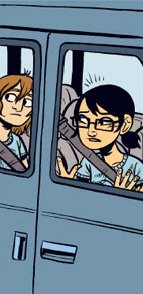 SPURGEON: How much have you learned working with other writers on comics projects in terms of how you approach those tasks yourself? Is there something that's different about your work having done, say,
SPURGEON: How much have you learned working with other writers on comics projects in terms of how you approach those tasks yourself? Is there something that's different about your work having done, say, Brain Camp
, or now working with J. Torres, that you can point to?
HICKS: Working with a writer can be tough. Before
Brain Camp, I had never worked with any kind of writer; I'd been left alone to do my comics my way, to develop my own opinions on how I wanted things to be paced... that was the toughest part, giving up the pacing control! But
Brain Camp especially was good for me, because I think it forced me to take a good hard look at my artwork, and see where it was technically, and question if it needed to be better. (Answer: it did.) So I feel like I grew up as an artist over the course of that book, transitioned from amateur to professional. I changed my art tools, switched from using a brush pen to an actual brush, started relying a lot more on reference and trying to figure out how things actually
look. Not how I thought they looked, how they
actually look. It was a huge wake-up call. I don't think it would have happened if I'd been writing my own comic, because I think sometimes I figure I can get away with slacking a bit on the artwork because I can make the writing clever, or mess with the comic pacing.
I don't really feel like I'm a true artist, in the drawing sense. I don't think my technical skills are my greatest selling point. I'm not
Jillian Tamaki, who just makes you gasp because her linework is so beautiful. I think my artwork is, now, because I've flogged the hell out of it these past couple years, quite serviceable, but it's not... it's not Jillian Tamaki. I can draw weird facial expressions pretty well, though. So that's good. [Spurgeon laughs]
Anyway, I guess the point is that it's good for me to work with a writer every now and then, because it forces me to examine my artwork and see where it's weakest, because I'm not concentrating on the writing. My only job is the artwork, and I want to do the best job that I can. No hiding behind writer cleverness allowed. Also, the best thing about working with a writer is that you get to try things you might not normally try, because the writer brings a completely different brain to the comic making. I'd really like to do a true collaboration with someone some day. Not just a "here's the script; go draw it" collaboration, but a real hands on back and forth with another person, writer or artist.
 SPURGEON: I was surprised to learn that you write full script, or at least that's my understanding from something you said in an interview. Is there a reason you write before you draw as opposed to working that out on the page? Does how you work vary at all project to project?
SPURGEON: I was surprised to learn that you write full script, or at least that's my understanding from something you said in an interview. Is there a reason you write before you draw as opposed to working that out on the page? Does how you work vary at all project to project?
HICKS: Oh, I thumbnail and write when I do my initial script. I get a thick pad of lined notebook paper, and I do the thumbnails on one side of the paper and scribble in dialogue on the other side. I feel it's really important to do both at the same time, initially, because comics are this wonderful balance of art and writing, and I don't think one should trump the other. Plus it's a good method to figure out pacing in the comic, having the thumbnails emerging organically along with the writing. After I'm done thumbnailing it out, I type up the script, tightening and polishing as I go, but if I have to rework a scene, it's always in thumbnails first. I work this way with pretty much everything, although if I'm doing something goofy and short -- like for the Internet -- I don't bother typing up the script. I started working this way back at the very end of my old webcomic
Demonology 101, so I've been doing it a while.
SPURGEON: You have a natural facility with page design in that it looks like you feel comfortable working a number of structures on the page -- it may be that you favor three-tier pages, but that almost makes your switches to two by twos or single images more striking for the rhythm you've established. You're working mostly in YA territory, which I think of as very story-driven. What are your concerns in terms of presenting your stories visually, the density and the pacing of it?
HICKS: I always want what I draw on the page to be in service to the story. That's my number one concern. How do these panels push the story forward, how do they support it, and support the emotion of the scene? Panelling's kind of new to me...
Friends With Boys was very experimental for me; before I drew it all my other books didn't deal with bleeds or with decompression in quite the same way, but when I drew
Friends With Boys I really wanted to give the manga style panelling a try. It's mostly Naoki Urasawa's influence, and lately
Hiromu Arakawa (
Fullmetal Alchemist), as she's very good with action.
I find panelling very puzzling, actually. Sometimes it drives you into the story, but not in ways that you expect. I remember how Urasawa used panelling in
Pluto, especially in this one scene where robot detective Gesicht is accused of killing a man, and there was just a single panel of his reaction, but the bottom of the panel was slanted downwards, like it was collapsing... it was really, really striking and made the moment impact on me in a much larger way than if it was a simple rectangular panel. I felt sucked into the scene. But then there's guys like
Jaime Hernandez who use more simplistic paneling, and I feel very engaged in their storytelling too. I can't put my finger on why they both work, since they're both so different. I'm still learning, still experimenting.
 SPURGEON: I like your work with setting, particularly in that you don't seem to overstress that element given the narrative demands -- my memory is that you don't call attention to that part of your work. How fully fleshed-out is the physical setting of something like
SPURGEON: I like your work with setting, particularly in that you don't seem to overstress that element given the narrative demands -- my memory is that you don't call attention to that part of your work. How fully fleshed-out is the physical setting of something like Friends With Boys
before you go to work on it? Is it conceptually sound, something you know what it looks like in your head? Do you preliminarily sketch settings or locations?
HICKS: The War At Ellsmere, which was my second SLG book, was the first time I really thought about place and how the setting the characters were in would influence them. I didn't really have the technical skills when I made that comic to realize the setting as much as I wanted, but I took what I learned and applied it to
Friends With Boys, which used
Halifax as a setting. Well, fake Halifax. I wanted the town in
FWB to be small, so it couldn't be Halifax, but Halifax houses and streets had the right look that I wanted for the comic, so I cherry picked what I liked, and drew it. Sometimes I do preliminary sketches, but mostly I have a huge folder of reference on my computer, to take a look at when I need to draw a house or a street. If you have reference to give your imaginary comic book town a sense of place, I think it can add a lot of weight to your drawings.
Back to what I said before, about paneling and how everything I do is in support of the story, I think of setting in the same way. It should support the story, not distract from it. I like it when you establish a setting at the beginning of a scene, really, really establish it, make sure the reader knows exactly where the characters are and how they're interacting with the background, and then over the course of the scene, let the setting fade from the panels. The scene can then be just about the characters and their emotions. I'm not saying don't draw anything in the background, but as long as the setting has been established, and the reader knows where the characters are in the environment, maybe you don't need some crazy detailed drawings behind someone's head. (Unless, of course, that background is really important to the scene.) Good manga does this technique very well, and so do American cartoonists like
Raina Telgemeier. I guess my example would be the scene in
Friends With Boys where Maggie's lying under her bed and her brother crawls under the bed and they talk. There's a page of establishing the setting, the bed, the quilt on the bed, the wood panelling of the floor, but for the rest of the scene, the background fades away, because I want the scene to be about these two characters talking, not about how well I can draw detailed woodgrain.
SPURGEON: I'm going to spare you another question about the autobiographical elements of Friends With Boys
, but I am intrigued by the fact you were home-schooled for a time. How big a foundational experience is that for you given the kind of make-it-up experience that cartooning can be? Do you think you have a more fine-tuned appreciation of social setting both in your work and outside of it than other people might?
HICKS: Hm, I don't know. Maybe? I'm of the opinion that the structured school environment and hours and hours of television is probably not the best thing for developing a creative mind. I would create stories as a kid because I was bored out of my skull and wanted to be entertained. I have a lot of social anxiety due to not spending a lot of time with my peers growing up, and not developing the same way socially, but I don't know if that makes me a better social observer.
 SPURGEON: Let me follow up a bit on that comment about the scene under the bed. I think that's one of two complexly-staged scenes in the book, that and the one with the kids at the movie theatre. Beyond establishing the setting in a way those physical details can be dropped so that the focus goes to the character, is there any secret you have about extended setpieces like those, scenes that might be defined by real subtleties of character interaction? How important does it get to you to nail certain scenes like that in the overall landscape of a book?
SPURGEON: Let me follow up a bit on that comment about the scene under the bed. I think that's one of two complexly-staged scenes in the book, that and the one with the kids at the movie theatre. Beyond establishing the setting in a way those physical details can be dropped so that the focus goes to the character, is there any secret you have about extended setpieces like those, scenes that might be defined by real subtleties of character interaction? How important does it get to you to nail certain scenes like that in the overall landscape of a book?
HICKS: Oh man, so important. Or rather, important to me as a reader, and I think I approach comics from that perspective: I want to make the kind of comics I want to read. I think if you can get those moments in a book where you can wrap the reader up in the character's emotions and what the characters are feeling in the scene, then you have a reader that's really clicked with the book. That's something I strive for. I don't know if I have any secrets to those scenes, but I like watching people interact in real life, and I like seeing how actors work and how they draw you into the emotions of the character they're playing.
I've been watching
Breaking Bad a lot lately, and I quite like what
Bryan Cranston does as an actor, dragging the viewer into the scene and into understanding this horrible guy, Walter White. He's such an asshole, and yet you totally understand him, and can follow his deranged thought process. It's pretty fascinating. Anyway, my suggestion is to be an observer. Be interested in how people act towards each other in real life, and how skilled thespians can take regular emotions and twist them into fascinating drama.
I guess another tip would be to be okay with letting a scene breathe, and being okay with having silence in a scene. I love a silent scene, where you have characters reacting and responding to each other, but not speaking. You don't have to have talking in every single panel.
 SPURGEON: Can you talk a little bit about how the ghost storyline was folded into the rest of the narrative? That material fascinated me because it seemed like the main thrust of the story didn't really need a supernatural element. What do you think those scenes add to
SPURGEON: Can you talk a little bit about how the ghost storyline was folded into the rest of the narrative? That material fascinated me because it seemed like the main thrust of the story didn't really need a supernatural element. What do you think those scenes add to Friends With Boys
that you couldn't have covered or engaged otherwise?
HICKS: For me the Ghost is a layer in the book, something that adds to both the setting and the sense of loss that Maggie is feeling. I made the decision very early in drawing
Friends With Boys that I would have the town the comic is set in be inspired by Halifax. Every building I drew is a Halifax reference. I moved to Halifax a few years ago from the suburbs of Ontario, and I'd never lived in a city that was really old or one that was beside an ocean. It's an interesting city, this modern city layered on top of a really old one. There's lots of graveyards downtown. I love this one graveyard that's smack in the middle of the city; it has 1,200 grave markers and over 12,000 bodies in it. I find it pretty fascinating, the death and hardship that seems to be wrapped up in the history of this city.
I have guy friends who are very much into the romance of the sea, the stories of seafaring and these ancient manly times where it was all about the saltwater on your face and fishing for a living. It always struck me as kind of horrible: the men would go off to sea to make a living and maybe they wouldn't come home, because the sea drowns people and the women are left behind. The ghost is someone left behind by the realities of making a living in this seafaring city.
SPURGEON: One way to see the ghost subplot would be as the ultimate expression of Maggie wanting to fix something given how much in her own life kind of thwarts such a fix. I thought that was an astute observation of how a lot of kids react to a new situation, or a home in crisis. Is there something you to say about that specific outlook that a kid brings on when things aren't going well?
HICKS: I don't know if I was trying to say something about outlook, but it's something I understand very well. It's tough when there's something in your life that affects you a lot, but you have no control over fixing it. And kids are especially powerless, having no way to disentangle themselves from family drama, so of course you seek out things that you do have control over and focus on that. I know I didn't really want to comment on people who behave that way, because I've done it myself, fixating on things to "fix" even though you have no business fixing that thing. That's probably where my more sympathetic outlook to Maggie's (probably) stupid behavior comes from: I've been there, done that. I understand why it happens.
 SPURGEON: Another way that I enjoyed the sparsely applied supernatural trappings is as a representative for how we all -- and maybe teens especially -- have problems that are just beyond the understanding of parents and other concerned outsiders. Is that a fair reading?
SPURGEON: Another way that I enjoyed the sparsely applied supernatural trappings is as a representative for how we all -- and maybe teens especially -- have problems that are just beyond the understanding of parents and other concerned outsiders. Is that a fair reading?
HICKS: Completely fair, and really astute. Hurrah! [Spurgeon laughs] Nowadays I think it's old hat for a story to put forth this idea that the supernatural can be a metaphor for what you go through as a teenager, but I remember as a teen myself being so shocked when
Joss Whedon did it in
Buffy the Vampire Slayer. It also kind of relates to what you were talking about before, about how typical it is for kids to try and fix something in their life that has nothing to do with their actual problems: Oh, if I just defeat that vampire, the pain I feel over this family situation may ease a little. If you're a teen dealing with broken home issues, or whatever issue, you don't always want to read about kids in that situation when you're looking for entertainment. But reading about someone like you, maybe with a missing mom or dad, defeating evil and saving the world... it can be cathartic.
SPURGEON: How much do you think through the metaphorical aspects of the story you're telling while you're doing it, or even beforehand, and how much develops on its own, do you think?
HICKS: When I first started
Friends With Boys, the ghost didn't have so many metaphorical qualities. She was just this unusual presence that was there as an outgrowth of the Halifax setting, but it made sense when she stepped in as a metaphor for Maggie's mom and for all the things that are unfixable in the world. I like it when stuff like that happens; you just write and develop your story and pieces of it take on new shapes that you didn't anticipate.
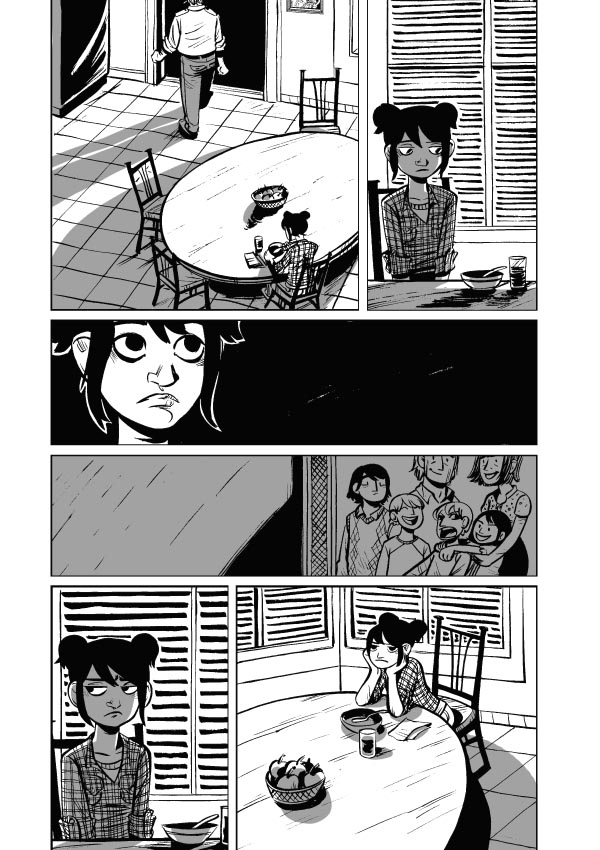 SPURGEON: I admired the restraint shown with the character of the mother. Was it tempting at all to bring her back? Ultimately, what made you decide not to?
SPURGEON: I admired the restraint shown with the character of the mother. Was it tempting at all to bring her back? Ultimately, what made you decide not to?
HICKS: Hah, probably because if I did bring her back, I'd have to write and draw another 200 pages dealing with the fallout of her return. I had to deal with a parent leaving when I was in college, and then coming back, which was its own level of emotional turmoil. I very very briefly considered ending the book with Maggie's mom coming home, and just a final scene with the two of them confronting each other, but I didn't even approach my editor about it. I got a lot of questions as to why Maggie's mom left and whether or not she'd come back, and I don't have concrete answers to either, and that's on purpose. I really wanted the book to be about Maggie learning to grow while dealing with this constant state of loss. Having a parent leave is a very odd feeling. They're gone but they're not dead, so you're not really sure what to do with the situation. It feels like everything's frozen in amber, your relationship with them, your relationship with your psyche... Maggie makes the hard-won decision to move on, even though the situation with her family isn't really resolved and some days she's not okay.
SPURGEON: There's a very funny scene late in the book when a group of the characters are taking something back they want from a group of people they don't like. It's told with a great deal of symmetry on two pages facing one another. How comfortable are you with using structural tricks like that to build a scene, or to underline an element within the story you want to see emphasized?
HICKS: I didn't even notice those pages were symetrical until you pointed it out. I went back and looked at them and thought, "Oh hey, this looks good! My subconscious is a better cartoonist than I am." But I do really like scenes like that where you repeat the same panels in order to stretch out the timing of the scene. It's fun to try and make the reader really really aware of the passage of time; Jeff Smith does it so well in
Bone, playing for both comedy and suspense. I find that I get kind of anxious if the pages I draw end up looking too similar in terms of their paneling, so I don't tend to do it too often.
SPURGEON: Given that you're still developing your skills in a lot of different areas and mentioned what you developed on some of those earlier projects -- what's the takeaway here, for you, in terms of adding to the skillset. How were you a different cartoonist by the time you got to the last pages you did on Friends With Boys
?
HICKS: Experimenting with paneling in
Friends With Boys was a lot of fun, and I learned a lot in that respect. It was really scary at the beginning. I didn't really know what I was doing -- I had to go back and do a lot of correcting once I was finished with the book -- so I'd have a copy of some Urasawa book close at hand, and I'd stop and stare at it when I got stuck. Now I feel a lot more comfortable with paneling, and I think it'll show in my later works. I feel a lot more confident in my skills now that I have
Friends With Boys under my belt; it's my first comic where I felt very aware of what I was doing as a cartoonist, aware of what makes a good comic, and that's a great feeling to have. Also, putting the comic online and blogging about my techniques making it was a very good experience. Sitting and writing down why I made the choices I did with that book, as well as why I like certain techniques more than others helped me work through a lot of my thought process.
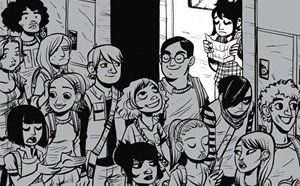 SPURGEON: Has there been any blowback on the title? That's a fantastic title, but one thing I like about the comic is that it isn't the concept suggested in the title but what happens to a person like that -- it's a starting point rather than a finishing point, and in fact the most important relationships Maggie develops are all with female characters, living, dead and absent. How attentive are you generally to what people say after publication, how people have reacted to what you've done?
SPURGEON: Has there been any blowback on the title? That's a fantastic title, but one thing I like about the comic is that it isn't the concept suggested in the title but what happens to a person like that -- it's a starting point rather than a finishing point, and in fact the most important relationships Maggie develops are all with female characters, living, dead and absent. How attentive are you generally to what people say after publication, how people have reacted to what you've done?
HICKS: I'm waaayy too attentive. It's the problem of being on the Internet; if there's a review out there of the book, good or bad, I'm probably going to read it. The title... it's been weird how there's been a vocal minority of people who don't get it. The purpose behind it is exactly as you say, it's Maggie's starting point in the book. She's had a certain kind of relationship up until that point, and now she has to push beyond her comfort zone and the comic is about her doing so. It's weird, I remember this one critic complaining "I kept waiting for Maggie to make friends with all these boys!" and I was like, "Um... well, she's done that already. Now she's learning new things."
SPURGEON: Are you friendly with other cartoonists? Do you have a direct peer group, do you think? Who out there do you consider kind of in the same place you are, or with similar concerns?
HICKS: Oh, gosh, I am slightly horrified... I mean, there are plenty of cartoonists that are maybe my peers, but I don't consider myself on the same skill level as them. I love what Raina Telgemeier does, how she's practically a one-woman ambassador for comics, but my books aren't on the
New York Times bestseller list, so it's probably insulting to compare myself to her. Same goes for folks like Nate Powell or Becky Cloonan. I like their work very much and I think we're all around the same age, but I don't think I'm peers with them. I'm ambitious, though, and I'm working hard. I think I'll catch up someday.
SPURGEON: In the end, are you happy you wrote the post that was so well-traveled about your financial situation in comics? Was any part of how people reacted to that unpleasant for you, or surprising? Why do you think people talking frankly about the financial considerations involved with making art remains such a rarity? What would you have a younger cartoonist take away from your frank appraisal of your own prospects? Did anything about how that unfolded surprise you?
HICKS: The response to that post was a little surprising. I certainly didn't expect it to blow up the way it did. I wrote it because of course I'm online and I'm part of the online comic community, and if you're part of that world you get exposed to the harsh realities of the financial end of making comics, like creators sacrificing their lives to comics and not being rewarding financially. And of course, there's always the horrifying cries for help whenever a freelancer gets sick, and they have no health care, so they have to go begging to the comic community. It's really rough to read that stuff online and worry that you may be in that situation in the future.
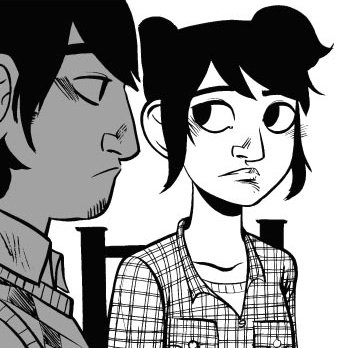
I wanted to write something that was maybe a little more positive, a "this is how I make this work" post, as opposed to an "oh god, I'm so poor, don't ever go into comics, kids!" post. I understand completely why people get so negative towards working in comics: it's hard work and often with little reward, but I feel I've actually been rewarded quite a bit in the last few years. I've worked with a couple of great publishers, and have almost managed to make a living wage. So I wanted to write about that aspect, and how I'm managing to make a living at my dream job, and here are some helpful tips for making a go at it. But I didn't want to sugarcoat it; I make some sacrifices to work in comics, sacrifices of a financial nature, and at this point in my life, I am fine making those sacrifices. Maybe I won't be fine with it when I'm 45 and still making the same money I do now, but right now when I'm young and want to work in comics... life feels really good.
I think the post reached the people I wrote it for, which was those who are maybe just starting out making comics and looking at making a living at it. I wrote it for them, as both encouragement and also as a warning. This kind of life isn't for everyone, and I certainly don't think I'm braver or better or more blessed than anyone out there who draws comics and maybe doesn't make a living at it, I just ended up here through some special circumstances, and that's kind of the most awful thing about trying to make a go of making a living in comics: so much is out of your control. I mean, look, if I'd had a good job when I'd started getting paying work in comics, I probably wouldn't have jumped into freelance life. Everyone likes stability. I'd like to own a house someday. But I lost my job, and couldn't find another. And then along comes First Second, saying hey, draw a book for us, we'll pay you. And I did that, and then I got to draw another for them, and another.
I didn't mind so much the huge negative response thrown my way by
the Beat commenters when Heidi [MacDonald] blogged about my post; I don't know how much of that was actually about me or about frustrations towards the cost of comics and the piracy issue, although I did eventually wade into that comment thread to correct those who were blatantly taking my words out of context. I think the problem with talking about money is that even though I was talking about my own life and how I live it, people thought I was judging their lives. One cartoonist seemed to think I was implying my comics were better because I make comics full time, which was really upsetting to me. I just wanted to talk about my own life and how I make it work, but I understand why people took it personally, even though the post had absolutely nothing to do with them. I get like that sometimes too: reading about someone else who's making a fortune merchandising their character, or pinching pennies to make ends meet: sometimes it feels like commentary on my own life, and how I'm not living it the right way. Even though it has absolutely nothing to do with me.
I'd like to say that I had a really wonderful year last year, and this year's been good too, although neither have paid spectacularly well (I made $19,000 last year). Working on some great projects for good American and Canadian publishers, and getting some good freelance work too. I've been working non-stop in comics and freelance since early 2011, and it's been the longest stretch of consistent work I've ever had since graduating from school in 2004. Seriously! I've had more consistent work in comics than I ever did in animation. Weird, huh?
SPURGEON: Will you be making comics ten years from now?
HICKS: Yes. I don't know what the future of comics is, or if I'll be making comics for a living in ten years, but I'll always make them. Even if I don't get paid. They're the perfect way to tell the millions of stories I have in my head.
*****
*
Friends With Boys, Faith Erin Hicks, First Second, softcover, 224 pages, 9781596435568, 2012, $15.99.
*****
* cover to the new book
* what we finally settled on as a representative self-portrait
* from
War At Ellsmere
* from
Brain Camp
* a panel I like from very early on in
Friends With Boys
* setting (from
Friends With Boys)
* the watching-a-movie sequence from
Friends With Boys
* two scenes featuring the
Friends With Boys ghost
* the Mom character as she hangs over certain scenes in
Friends With Boys despite not appearing
* two panels I just sort of like from the book; the second one is even part of a panel
* because we didn't talk about it at all -- my fault! -- here's an installment of
The Adventures Of Superhero Girl (below)
*****
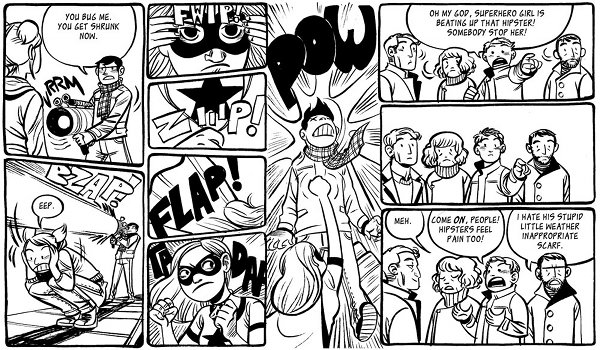
*****
*****
posted 6:00 am PST |
Permalink
Daily Blog Archives
November 2019
October 2019
September 2019
August 2019
July 2019
Full Archives


